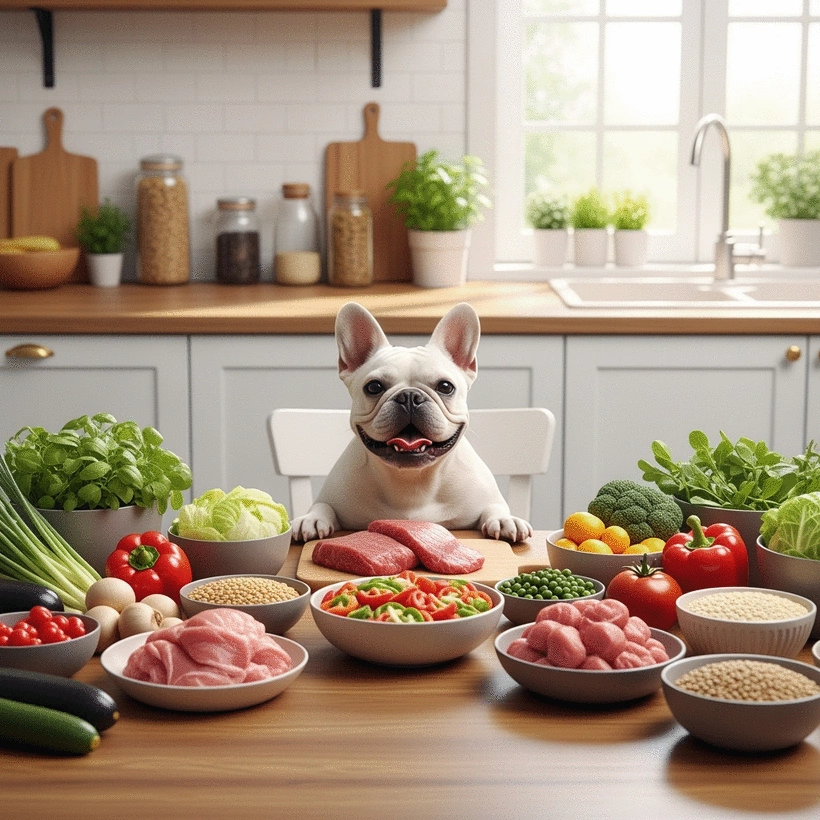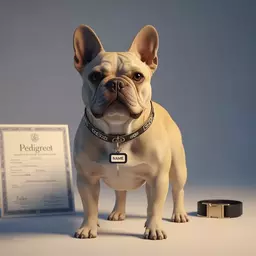Healthy Meal Plans for Bulldogs

Have you ever noticed how a dog's diet can significantly impact their overall health and happiness? For French Bulldogs, understanding and catering to their unique nutritional needs is more than just a choice—it's essential for their well-being.
What You Will Learn
- The importance of breed-specific nutrition to support health and prevent common issues like obesity and allergies.
- How essential vitamins contribute to your French Bulldog's immune function, skin health, and energy levels.
- Common dietary allergens and digestive problems that can be managed through careful meal planning.
- Key takeaways for preparing home-cooked meals, including ingredient quality, dietary understanding, and the need for variety.
- The significance of consulting professionals to tailor your dog's diet effectively and ensure their health is monitored.
Optimizing French Bulldog Health: Diet and Care Essentials
Understanding the unique nutritional needs of French Bulldogs is crucial for their well-being. This visual highlights key dietary components and considerations for a healthier, happier Frenchie.
Why Breed-Specific Nutrition Matters
- ✓Supports optimal growth & development
- ✓Helps maintain a healthy weight
- ✓Reduces risk of allergies & skin issues
- ✓Promotes digestive health
Diet Solutions for Allergies & Digestive Concerns
- ⚠Food allergies: Grains, chicken, beef
- ⚠Digestive problems: Sudden diet changes
- ⚠Skin irritations: Linked to diet allergens
Essential Vitamins for Health
- Vitamin A: Vision & immune function
- Vitamin D: Calcium absorption (strong bones)
- Vitamin E: Antioxidant, cell protection
- B Vitamins: Energy metabolism, skin health
Home-Cooked Meal Key Takeaways
- Quality ingredients: Fresh, human-grade
- Dietary needs: Adjust for age, size, activity
- Variety is key: Mix proteins & veggies
- Stay informed: Consult vet/nutritionist
Understanding the Unique Nutritional Needs of French Bulldogs
As a proud French Bulldog owner, I've learned that understanding our pets' unique nutritional needs is vital for their health and happiness. French Bulldogs have specific dietary requirements that differ from other breeds due to their unique physiology. Providing them with breed-specific nutrition not only supports their overall well-being but also helps prevent common health issues.
It's essential to recognize that what works for one breed may not be suitable for another. This is where the French Bulldog Guide comes into play, offering tailored advice to ensure your furry friend thrives in the Australian climate!
Why Breed-Specific Nutrition Matters for Your French Bulldog
When it comes to feeding our Frenchies, understanding the significance of breed-specific nutrition is key. French Bulldogs are prone to certain health issues, including obesity and skin allergies, which can often be managed through appropriate diet choices. By providing them with the right nutrients, we can help keep these problems at bay!
- Supports optimal growth and development
- Helps maintain a healthy weight
- Reduces the risk of allergies and skin issues
- Promotes digestive health
Investing in breed-specific dog food can lead to a happier, healthier life for your French Bulldog. Have you noticed how their energy levels fluctuate based on what they eat?
Common Health Issues Addressed Through Diet: Allergies and Digestive Concerns
As passionate advocates for the French Bulldog breed, we often hear about the common health concerns these dogs face, such as allergies and digestive issues. Many Frenchies struggle with food allergies that manifest as skin irritations or gastrointestinal problems. Ensuring they have a balanced diet can alleviate these symptoms and improve their quality of life!
- Food allergies: Often caused by grains, chicken, or beef
- Digestive problems: Can occur from sudden diet changes or low-quality food
- Skin irritations: Linked to allergens in their diet
Being proactive in managing these dietary sensitivities can significantly enhance your pup's comfort and happiness. For more detailed information on preventing specific health problems, consider reading about French Bulldog Health Issues Explained. Have you tried adjusting your Frenchie's diet to address any of these issues?
The Role of Essential Vitamins in Your French Bulldog’s Diet
Vitamins play a crucial role in maintaining our French Bulldogs’ health. Essential vitamins like A, D, E, and B-complex are vital for supporting their immune system, skin health, and energy levels. Understanding how to incorporate these vitamins into their diet is key to ensuring their overall well-being!
- Vitamin A: Supports vision and immune function
- Vitamin D: Aids in calcium absorption for strong bones
- Vitamin E: Acts as an antioxidant, protecting cells
- B Vitamins: Essential for energy metabolism and skin health
By focusing on a well-rounded diet rich in essential vitamins, we can help our French Bulldogs lead vibrant, healthy lives. Remember to consult your vet about the best ways to incorporate these nutrients into your dog’s meals!
Pro Tip
Did you know? Incorporating Omega fatty acids into your French Bulldog's diet can significantly improve their skin and coat health. Look for dog foods rich in fish oil or consider adding supplements, but always consult your vet before making changes!
Summarizing the Benefits of Home-Cooked Meal Plans for French Bulldogs
As a passionate French Bulldog enthusiast, I can tell you that home-cooked meals offer fantastic benefits for our beloved pets! With the right approach, you can ensure your Frenchie receives a balanced diet tailored specifically to their needs. Not only does this improve their overall health, but it also strengthens the bond between you and your furry friend.
One major advantage of preparing meals at home is the ability to control the ingredients. This means you can avoid fillers and additives commonly found in commercial dog foods. Instead, you can focus on wholesome, nutritious options that truly nourish your French Bulldog!
Balancing Nutrition Safely: The Key Takeaways for Dog Owners
- Quality ingredients: Always choose fresh, human-grade foods to provide optimal nutrition.
- Understanding dietary needs: Each dog is unique! Adjust meals based on their size, age, and activity level.
- Variety is key: Mix different protein sources and vegetables to keep meals interesting and nutritious.
- Stay informed: Consult with your veterinarian or a pet nutritionist when in doubt about specific dietary choices.
These key takeaways are essential for any French Bulldog owner looking to transition to home-cooked meals. Remember, it's all about fostering a healthy lifestyle for your furry companion!
Taking the Next Steps: Engaging with Your French Bulldog's Nutrition
Now that you understand the benefits of home-cooked meals, it's time to take actionable steps towards enhancing your Frenchie's diet. This journey can be incredibly rewarding, and I'm excited to share some practical tips with you!
Consulting Professionals: When to Involve a Veterinarian or Nutritionist
- Initial consultation: Always consult your vet or a pet nutritionist before making significant changes to your dog's diet.
- Monitoring health: Schedule regular check-ups to ensure your French Bulldog is thriving on their new meal plan.
- Seeking guidance: Don't hesitate to ask questions regarding specific ingredient choices or health concerns.
By involving a professional, you can tailor your French Bulldog's diet to suit their individual needs while ensuring they stay healthy and happy.
Encouraging Feedback: Sharing Your Experiences with Home-Cooked Meals
Your experience is invaluable! I encourage you to share your journey of transitioning to home-cooked meals for your Frenchie. What have you discovered along the way? Your tips could help fellow owners navigate their own meal planning!
Join our community by leaving comments or connecting with other dog lovers on social media. It's a wonderful opportunity to learn from each other and foster a supportive environment!
Meal Planning Tools for Efficient Cooking for Pets
- Recipe apps: Use smartphone apps designed for pet recipes to simplify meal planning.
- Tracking tools: Keep track of your Frenchie's nutritional intake and any changes in their health.
- Shopping lists: Create lists based on the recipes you plan to make, ensuring you have everything you need on hand.
By utilizing meal planning tools, you can save time and ensure you’re well-prepared to feed your furry friend delicious, nutritious meals. Let's make every meal a delightful experience for your French Bulldog!
Frequently Asked Questions About French Bulldog Nutrition
- Q: Why is breed-specific nutrition important for French Bulldogs?
- A: Breed-specific nutrition is crucial for French Bulldogs because it addresses their unique physiological needs and helps prevent common health issues like obesity, skin allergies, and digestive problems that they are prone to.
- Q: What are common dietary allergens for French Bulldogs?
- A: Common dietary allergens for French Bulldogs often include grains, chicken, and beef, which can lead to skin irritations or gastrointestinal issues. Identifying and avoiding these can significantly improve their well-being.
- Q: What essential vitamins should be included in a French Bulldog's diet?
- A: Essential vitamins for French Bulldogs include Vitamin A for vision and immune function, Vitamin D for strong bones, Vitamin E as an antioxidant, and B Vitamins for energy metabolism and skin health.
- Q: What are the benefits of feeding home-cooked meals to a French Bulldog?
- A: Home-cooked meals allow owners to control ingredients, avoid fillers and additives, and tailor the diet to their French Bulldog's specific needs, leading to improved overall health, better digestion, and reduced allergen exposure.
- Q: When should I consult a veterinarian or pet nutritionist about my French Bulldog's diet?
- A: It is always recommended to consult a veterinarian or pet nutritionist before making any significant changes to your French Bulldog's diet, especially when transitioning to home-cooked meals or if you have concerns about their health or specific dietary requirements. Regular check-ups are also important to monitor their progress.
Recap of Key Points
Here is a quick recap of the important points discussed in the article:
- Breed-Specific Nutrition: French Bulldogs have unique dietary needs that help prevent health issues such as obesity and skin allergies.
- Common Health Issues: Allergies and digestive concerns can be managed through a balanced diet, avoiding common allergens like grains and certain meats.
- Essential Vitamins: Incorporate vitamins A, D, E, and B-complex into their diet to support immune health, skin health, and energy levels.
- Home-Cooked Meals: Preparing meals at home allows for quality control over ingredients, leading to a healthier and happier French Bulldog.
- Professional Guidance: Always consult with a veterinarian or nutritionist when making significant dietary changes to ensure your dog’s health and well-being.







